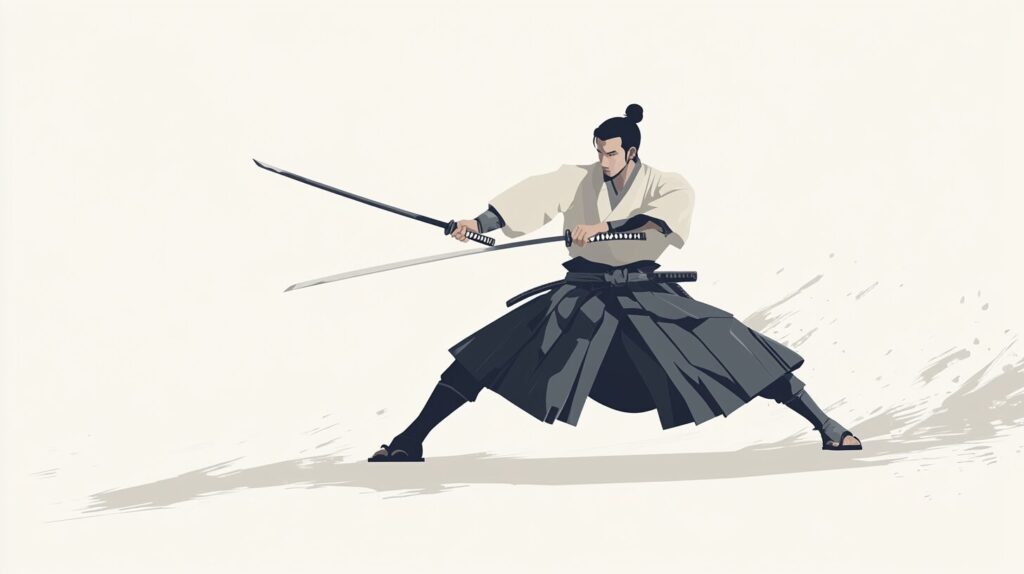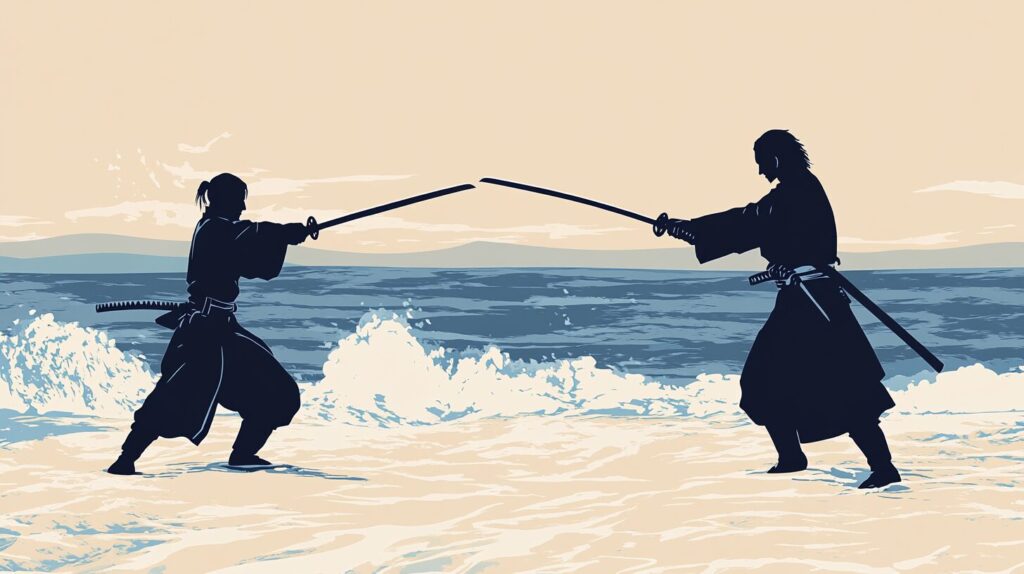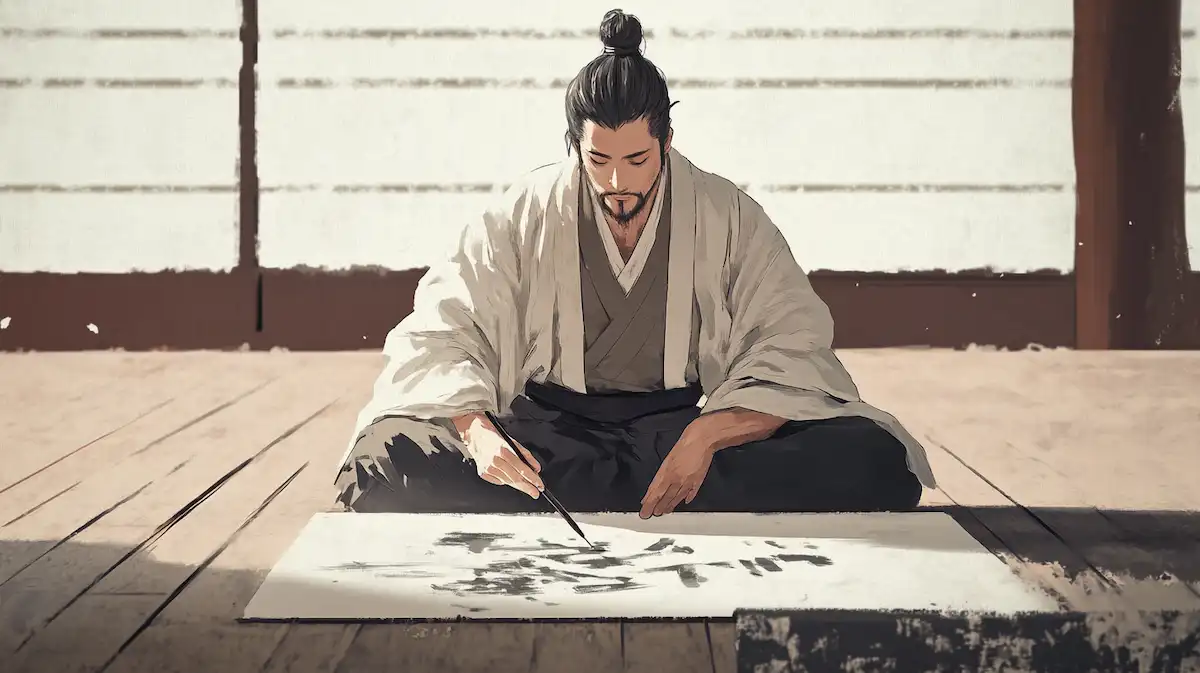宮本武蔵を英語で説明・紹介するための基本情報と、英会話に役立つ表現をシンプルでわかりやすい英語で紹介します。
英会話ダイアローグ・関連情報・10の質問を通して、宮本武蔵に関する英語表現を学びます。
英語
英会話ダイアローグを読む前に知っておくと良い前提知識と情報です。
- 宮本武蔵の基本情報
- 江戸時代初期の剣豪(1584年–1645年)、「二天一流」という二刀流の剣術スタイルを創始
- 生涯で60回以上の決闘に勝利し、無敗であったとされている
- 代表的なエピソード
- 巌流島の決闘:巌流島で佐々木小次郎との一騎討ちに勝利し、剣豪としての名声を確立
- 著書『五輪書』:武術観や戦略論を記した書物で、今でも武道やビジネスの世界で活用
- 武蔵の多才さ
- 剣術家としてだけでなく、書画や彫刻など、幅広い芸術分野でも活躍
- 宮本武蔵の哲学と生き方
- 常に謙虚で向上心を持ち続けた武人として、日本武道史に高く評価されている
- 「常に自己を向上させること」「戦いのみに囚われない人生観」など彼の哲学は、現代でも多くの人にインスピレーションを与えている
2人が宮本武蔵について話しています。
武蔵の無敗記録、二刀流「二天一流」の剣術、佐々木小次郎との巌流島での決闘、著書『五輪書』などを話題にしています。
会話 / dialogue

Hey Key, have you heard of Miyamoto Musashi? I’ve been really interested in him lately.

Of course! Musashi is one of Japan’s most famous samurai. What got you interested?

I read a bit about his undefeated record—he won over 60 duels! That’s amazing. And he created his own sword style, didn’t he?

Yeah, it’s called “Niten Ichi-ryu,” a two-sword style where he used a long and short sword together. It was pretty revolutionary at the time.

That’s impressive. I read about his duel with Sasaki Kojiro on Ganryu Island, too. Musashi arrived late on purpose and won using a wooden sword. Such an interesting tactic!

Exactly. He was known for his clever strategies. That duel made him legendary. Kojiro was also very skilled, so winning that duel really boosted Musashi’s reputation.

It sounds like he was a deep thinker, not just a swordsman. I found out he wrote The Book of Five Rings. Have you read it?

I’ve read parts of it. It’s more than just a sword-fighting manual. Musashi shares his philosophy on life and strategy. It’s still used in martial arts and even in business strategies today.

That’s what caught my attention! He wasn’t just focused on fighting but had a bigger view of life. I admire that he valued constant improvement.

Exactly. And he was always learning and developing his skills. Even in his later years, he kept training and exploring new ideas.

I also didn’t realize he was an artist. He did ink paintings and sculptures, right? I saw one called the “Picture of a Cormorant,” which showed a really delicate side of him.

Yes, his artwork shows a different side of Musashi—one that’s creative and thoughtful. His art is part of Japan’s cultural heritage now.

It’s fascinating how he balanced being a warrior and an artist. I think that combination makes him unique.

It really does. His dedication to both fighting and art shows his depth. He wanted to master everything he was interested in.

And I read that even though he was undefeated, he stayed humble. He didn’t show off and kept learning from each experience.

Right, that humility is part of what made him so respected. He believed in self-discipline and independence—he didn’t rely on any particular school or master.

It’s inspiring. I want to learn more about how he lived and trained. Do you know if there are places where we can learn more about him?

Yes! You could visit places related to his life, like Kumamoto, where he spent his later years. They even have a statue of him there.

That sounds great! I feel like learning about his life will help me understand his philosophy better.

Definitely. Musashi’s life is about more than just swordsmanship. It’s about dedication, independence, and always challenging yourself.

Thanks for all this info, Key. I’m excited to dive deeper into Musashi’s world. There’s so much to learn from him.

Anytime, Mack. Musashi is inspiring in so many ways. Let’s keep learning together!
関連情報 / related information
「宮本武蔵」について、理解を深めるための「英語での関連情報」です。
宮本武蔵

Introduction to Miyamoto Musashi
Miyamoto Musashi was a famous Japanese swordsman, philosopher, and artist from the early Edo period. He was born in 1584 and became known for his undefeated record in over 60 duels. Musashi is admired not only for his swordsmanship but also for his philosophy and unique view of life.
Niten Ichi-ryu: Musashi’s Two-Sword Style
Musashi created a unique sword-fighting style called “Niten Ichi-ryu,” which means “Two Heavens, One Style.” This style uses two swords—one long and one short—at the same time. This was revolutionary in his time and helped make him a respected figure in the world of martial arts.
The Duel on Ganryu Island
One of Musashi’s most famous duels was in 1612 on Ganryu Island, where he fought Sasaki Kojiro, a skilled swordsman. Musashi arrived late on purpose and used a wooden sword to win the fight. This duel made Musashi legendary in Japanese history.
The Book of Five Rings
Later in life, Musashi wrote The Book of Five Rings, a book about his philosophy on swordsmanship and life. It is still read today by people interested in martial arts and strategy, as it offers wisdom that can be applied beyond fighting.
Artist and Philosopher
In addition to being a swordsman, Musashi was also an artist. He created ink paintings and sculptures, showing a different, creative side of his personality. His balanced life of fighting and art makes him a unique and inspiring figure.
10の質問 / 10 questions
「宮本武蔵」について、理解を深めるための「英語での10の質問」です。
1: Who was Miyamoto Musashi?
Miyamoto Musashi was a famous Japanese swordsman, philosopher, and artist from the early Edo period. He is known for being undefeated in more than 60 duels.
2: What is Niten Ichi-ryu?
Niten Ichi-ryu is the unique two-sword style of fighting created by Musashi. In this style, he used both a long and a short sword at the same time.
3: Why is the duel on Ganryu Island famous?
The duel on Ganryu Island is famous because Musashi fought and defeated Sasaki Kojiro, another skilled swordsman, using a wooden sword and clever tactics.
4: What is The Book of Five Rings?
The Book of Five Rings is a book written by Musashi that explains his philosophy on swordsmanship and life. It is still read today for its wisdom on strategy.
5: Why did Musashi use a wooden sword in some duels?
Musashi sometimes used a wooden sword to show his confidence and skill. He believed he could win with technique and strategy rather than just a sharp weapon.
6: Was Musashi only a swordsman?
No, Musashi was also an artist. He created ink paintings and sculptures, showing a creative side to his personality.
7: What kind of philosophy did Musashi believe in?
Musashi believed in constant self-improvement, independence, and discipline. He focused on learning from every experience in life.
8: How did Musashi influence modern martial arts?
Musashi’s techniques and philosophy have influenced modern martial arts by teaching the importance of strategy, focus, and mental discipline.
9: Where did Musashi spend his later years?
Musashi spent his later years in Kumamoto, where he continued to practice and teach his sword techniques.
10: Why is Musashi still popular today?
Musashi is still popular because his ideas on strategy, self-discipline, and independence continue to inspire people in both martial arts and everyday life.

和訳付
会話 / dialogue

Hey Key, have you heard of Miyamoto Musashi? I’ve been really interested in him lately.
ねえ、キー、宮本武蔵って聞いたことある?最近彼にすごく興味があるんだ。

Of course! Musashi is one of Japan’s most famous samurai. What got you interested?
もちろん!武蔵は日本で一番有名な侍の一人だよ。どうして興味を持ったの?

I read a bit about his undefeated record—he won over 60 duels! That’s amazing. And he created his own sword style, didn’t he?
彼が無敗だったって少し読んだんだ。60回以上の決闘に勝ったんだって!すごいよね。しかも、自分の剣術スタイルを作ったんだよね?

Yeah, it’s called “Niten Ichi-ryu,” a two-sword style where he used a long and short sword together. It was pretty revolutionary at the time.
そう、「二天一流」っていうんだ。長い刀と短い刀を一緒に使う二刀流のスタイルで、当時としてはかなり革新的だったんだ。

That’s impressive. I read about his duel with Sasaki Kojiro on Ganryu Island, too. Musashi arrived late on purpose and won using a wooden sword. Such an interesting tactic!
それはすごいね。佐々木小次郎との巌流島での決闘についても読んだよ。武蔵はわざと遅れて木の刀で勝ったんだって。面白い戦術だね!

Exactly. He was known for his clever strategies. That duel made him legendary. Kojiro was also very skilled, so winning that duel really boosted Musashi’s reputation.
そうなんだよ。武蔵は巧妙な戦略で知られてた。その決闘で彼は伝説になったんだ。小次郎もとても腕が立ったから、あの勝利で武蔵の名声がさらに高まったんだ。

It sounds like he was a deep thinker, not just a swordsman. I found out he wrote The Book of Five Rings. Have you read it?
ただの剣士じゃなくて、深い考えを持ってたんだね。『五輪書』を書いたって知ったけど、読んだことある?

I’ve read parts of it. It’s more than just a sword-fighting manual. Musashi shares his philosophy on life and strategy. It’s still used in martial arts and even in business strategies today.
一部だけ読んだことあるよ。あれはただの剣術のマニュアルじゃないんだ。武蔵の人生哲学や戦略が書かれてるんだよ。今でも武道やビジネス戦略に使われてるんだ。

That’s what caught my attention! He wasn’t just focused on fighting but had a bigger view of life. I admire that he valued constant improvement.
それが気になったんだ!彼はただ戦うことに集中してたわけじゃなくて、もっと広い視点を持ってたんだね。常に成長を大切にしてたところが素晴らしいと思う。

Exactly. And he was always learning and developing his skills. Even in his later years, he kept training and exploring new ideas.
そうだね。彼は常に学び続けて技術を磨いてたんだ。晩年になっても訓練を続けて、新しい考えを探ってたよ。

I also didn’t realize he was an artist. He did ink paintings and sculptures, right? I saw one called the “Picture of a Cormorant,” which showed a really delicate side of him.
彼が芸術家だったのも知らなかった。墨絵や彫刻もしてたんだよね?「鵜図」っていう作品を見たけど、繊細な面が見えてきて。

Yes, his artwork shows a different side of Musashi—one that’s creative and thoughtful. His art is part of Japan’s cultural heritage now.
そうなんだ、彼の作品は創造的で思慮深い別の面を見せてくれるよ。彼の芸術は今では日本の文化遺産の一部だよ。

It’s fascinating how he balanced being a warrior and an artist. I think that combination makes him unique.
武士でありながら芸術家でもあるっていうバランスが面白いよね。その組み合わせが彼を特別な存在にしてると思う。

It really does. His dedication to both fighting and art shows his depth. He wanted to master everything he was interested in.
本当にそうだね。戦いと芸術の両方に捧げた姿勢が、彼の深みを感じさせるよ。彼は興味を持ったことはすべて極めようとしてたんだ。

And I read that even though he was undefeated, he stayed humble. He didn’t show off and kept learning from each experience.
無敗だったにもかかわらず、謙虚さを保ってたって読んだよ。自慢せずに、経験から常に学び続けてたんだって。

Right, that humility is part of what made him so respected. He believed in self-discipline and independence—he didn’t rely on any particular school or master.
そう、その謙虚さが彼が尊敬される理由の一つだよ。自己鍛錬と独立を信じていて、特定の流派や師匠に頼らなかったんだ。

It’s inspiring. I want to learn more about how he lived and trained. Do you know if there are places where we can learn more about him?
それは感動的だね。彼がどのように生きて訓練したのか、もっと知りたいな。彼についてもっと知れる場所ってある?

Yes! You could visit places related to his life, like Kumamoto, where he spent his later years. They even have a statue of him there.
あるよ!彼が晩年を過ごした熊本なんかがそうだね。そこには彼の銅像もあるよ。

That sounds great! I feel like learning about his life will help me understand his philosophy better.
それはいいね!彼の人生を知ることで、彼の哲学をもっと理解できる気がするよ。

Definitely. Musashi’s life is about more than just swordsmanship. It’s about dedication, independence, and always challenging yourself.
間違いないね。武蔵の人生は剣術だけじゃなくて、献身、独立、そして常に自分に挑戦することなんだ。

Thanks for all this info, Key. I’m excited to dive deeper into Musashi’s world. There’s so much to learn from him.
いろいろ教えてくれてありがとう、キー。武蔵の世界にもっと入り込むのが楽しみだよ。彼から学べることがたくさんあるね。

Anytime, Mack. Musashi is inspiring in so many ways. Let’s keep learning together!
いつでも、マック。武蔵は多くの面で刺激を与えてくれる存在だよ。一緒に学び続けよう!
関連情報 / related information
宮本武蔵

Introduction to Miyamoto Musashi
Miyamoto Musashi was a famous Japanese swordsman, philosopher, and artist from the early Edo period. He was born in 1584 and became known for his undefeated record in over 60 duels. Musashi is admired not only for his swordsmanship but also for his philosophy and unique view of life.
宮本武蔵は、江戸時代初期の有名な日本の剣豪、哲学者、そして芸術家でした。1584年に生まれ、60回以上の決闘で無敗の記録を残したことで知られるようになりました。武蔵は剣術だけでなく、彼の哲学や独自の人生観でも尊敬されています。
Niten Ichi-ryu: Musashi’s Two-Sword Style
Musashi created a unique sword-fighting style called “Niten Ichi-ryu,” which means “Two Heavens, One Style.” This style uses two swords—one long and one short—at the same time. This was revolutionary in his time and helped make him a respected figure in the world of martial arts.
武蔵は「二天一流」と呼ばれる独自の剣術スタイルを生み出しました。これは「二つの天、一つの流派」を意味し、長い刀と短い刀の二刀を同時に使うものです。このスタイルは当時としては革新的で、武道の世界で武蔵を尊敬される存在にしました。
The Duel on Ganryu Island
One of Musashi’s most famous duels was in 1612 on Ganryu Island, where he fought Sasaki Kojiro, a skilled swordsman. Musashi arrived late on purpose and used a wooden sword to win the fight. This duel made Musashi legendary in Japanese history.
武蔵の最も有名な決闘の一つが、1612年に巌流島で行われた佐々木小次郎との戦いです。武蔵はわざと遅れて到着し、木の刀を使って勝利しました。この決闘は、武蔵を日本の歴史の中で伝説的な存在にしました。
The Book of Five Rings
Later in life, Musashi wrote The Book of Five Rings, a book about his philosophy on swordsmanship and life. It is still read today by people interested in martial arts and strategy, as it offers wisdom that can be applied beyond fighting.
晩年、武蔵は『五輪書』という本を書きました。この本は剣術と人生に関する彼の哲学について書かれています。武道や戦略に興味を持つ人々によって今でも読まれており、戦いを超えて役立つ知恵が詰まっています。
Artist and Philosopher
In addition to being a swordsman, Musashi was also an artist. He created ink paintings and sculptures, showing a different, creative side of his personality. His balanced life of fighting and art makes him a unique and inspiring figure.
武蔵は剣豪であるだけでなく、芸術家でもありました。彼は墨絵や彫刻を制作し、彼の創造的な側面を示しています。戦いと芸術の両方に生きたバランスの取れた人生が、彼を特別で刺激的な人物にしています。
10の質問 / 10 questions
1: Who was Miyamoto Musashi?
宮本武蔵とは誰ですか?
Miyamoto Musashi was a famous Japanese swordsman, philosopher, and artist from the early Edo period. He is known for being undefeated in more than 60 duels.
宮本武蔵は、江戸時代初期の有名な日本の剣豪、哲学者、芸術家でした。60回以上の決闘で無敗だったことで知られています。
2: What is Niten Ichi-ryu?
二天一流とは何ですか?
Niten Ichi-ryu is the unique two-sword style of fighting created by Musashi. In this style, he used both a long and a short sword at the same time.
二天一流は、武蔵が生み出した独自の二刀流の剣術スタイルです。このスタイルでは、長い刀と短い刀を同時に使います。
3: Why is the duel on Ganryu Island famous?
巌流島での決闘が有名な理由は何ですか?
The duel on Ganryu Island is famous because Musashi fought and defeated Sasaki Kojiro, another skilled swordsman, using a wooden sword and clever tactics.
巌流島での決闘が有名な理由は、武蔵が木の刀と巧妙な戦術で、腕の立つ剣士佐々木小次郎に勝利したからです。
4: What is The Book of Five Rings?
『五輪書』とは何ですか?
The Book of Five Rings is a book written by Musashi that explains his philosophy on swordsmanship and life. It is still read today for its wisdom on strategy.
『五輪書』は、武蔵が書いた剣術と人生に関する哲学を説明する本です。戦略に関する知恵として、今でも読まれています。
5: Why did Musashi use a wooden sword in some duels?
武蔵が木の刀を使った決闘があるのはなぜですか?
Musashi sometimes used a wooden sword to show his confidence and skill. He believed he could win with technique and strategy rather than just a sharp weapon.
武蔵は時々木の刀を使って、自信と技術を示しました。彼は鋭い武器だけでなく、技術と戦略で勝てると信じていました。
6: Was Musashi only a swordsman?
武蔵はただの剣士だったのですか?
No, Musashi was also an artist. He created ink paintings and sculptures, showing a creative side to his personality.
いいえ、武蔵は芸術家でもありました。彼は墨絵や彫刻を制作し、彼の創造的な側面を見せていました。
7: What kind of philosophy did Musashi believe in?
武蔵はどのような哲学を信じていましたか?
Musashi believed in constant self-improvement, independence, and discipline. He focused on learning from every experience in life.
武蔵は、絶え間ない自己改善、独立心、そして自己鍛錬を信じていました。彼は人生のすべての経験から学ぶことに集中していました。
8: How did Musashi influence modern martial arts?
武蔵は現代の武道にどのように影響を与えましたか?
Musashi’s techniques and philosophy have influenced modern martial arts by teaching the importance of strategy, focus, and mental discipline.
武蔵の技術と哲学は、戦略、集中力、精神的な鍛錬の重要性を教えることで、現代の武道に影響を与えています。
9: Where did Musashi spend his later years?
武蔵は晩年をどこで過ごしましたか?
Musashi spent his later years in Kumamoto, where he continued to practice and teach his sword techniques.
武蔵は晩年を熊本で過ごし、剣術の練習と指導を続けました。
10: Why is Musashi still popular today?
武蔵が今でも人気がある理由は何ですか?
Musashi is still popular because his ideas on strategy, self-discipline, and independence continue to inspire people in both martial arts and everyday life.
武蔵は戦略、自己鍛錬、独立に関する彼の考えが、武道や日常生活で今も多くの人に影響を与えているため、人気があります。

words & phrases
英会話ダイアローグと関連情報に出てきた単語・フレーズです(例文は各3つ)。

duel : 名詞
意味: 決闘。二人の人物が戦うことで、特に歴史的には名誉を守るために行われた戦い。A formal fight between two people, especially in the past, to protect one’s honor.
(宮本武蔵と佐々木小次郎が巌流島で行った決闘を指す)
例文:
- Musashi won the famous duel against Kojiro on Ganryu Island.
「武蔵は巌流島での有名な小次郎との決闘に勝ちました。」 - The knights agreed to settle their argument with a duel.
「騎士たちは決闘で争いを決着させることに同意しました。」 - In the past, nobles often fought duels to defend their honor.
「過去には貴族が名誉を守るために決闘をすることがよくありました。」
humble : 形容詞
意味: 謙虚な。自分を控えめに評価し、驕らないこと。Not considering oneself as better than others; modest.
(無敗でありながら自慢せず、学び続けた宮本武蔵の謙虚な態度を指す)
例文:
- Despite his great skills, Musashi remained humble and continued learning.
「優れた技術を持っていながら、武蔵は謙虚で学び続けました。」 - She was very humble about her achievements.
「彼女は自分の業績について非常に謙虚でした。」 - Being humble can help you build good relationships with others.
「謙虚であることは、他人との良好な関係を築く助けになります。」
humility : 名詞
意味: 謙虚さ。自分を控えめにし、驕らないこと。The quality of not thinking you are better than others; modesty.
(宮本武蔵が無敗の剣士でありながら、謙虚さを持っていた点を表す)
例文:
- Musashi’s humility earned him respect from many people.
「武蔵の謙虚さは、多くの人々から尊敬を集めました。」 - True humility is shown through actions, not just words.
「本当の謙虚さは、言葉だけでなく行動を通して示されます。」 - He accepted the praise with humility, thanking his team for their support.
「彼は謙虚に称賛を受け、チームのサポートに感謝しました。」
self-discipline : 名詞
意味: 自己鍛錬。自分を律し、目標に向かって努力し続ける力。The ability to control one’s emotions and behavior to achieve goals.
(宮本武蔵が自己鍛錬と独立を大切にし、努力を続けた点を表す)
例文:
- Musashi’s success was due to his strong self-discipline and focus.
「武蔵の成功は、強い自己鍛錬と集中力によるものでした。」 - Good self-discipline is essential for reaching your goals.
「目標を達成するためには、良い自己鍛錬が必要です。」 - He practiced daily with self-discipline to improve his skills.
「彼は自己鍛錬をもって毎日練習し、技術を向上させました。」
swordsmanship : 名詞
意味: 剣術。剣を使う技術やスキルのこと。The skill or practice of fighting with a sword.
(宮本武蔵が剣術において無敗であり、自身の流派を創始したことを指す)
例文:
- Musashi’s swordsmanship was unmatched, making him a legendary figure.
「武蔵の剣術は無敵で、彼を伝説的な存在にしました。」 - He trained in swordsmanship from a young age.
「彼は若い頃から剣術の訓練をしていました。」 - Good swordsmanship requires not only skill but also mental focus.
「優れた剣術には、技術だけでなく精神的な集中力も必要です。」
